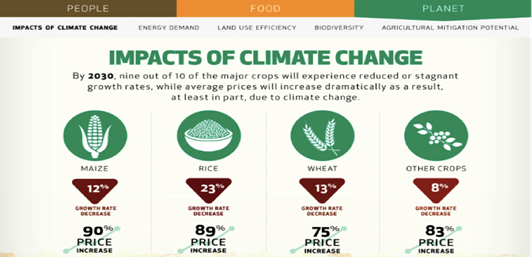

18th October 2022 (8 Topics)
Context
It is high time for India to develop technologies that not only fulfill food and nutritional needs but also address climate change.
Global Scenario:
- The global population in 1945 was a little less than 2.5 billion and was increasing at an annual rate of about 1.9 percent per annum.
- Today, there are almost 8 billion people on this planet, and there is ample food to feed them.
- Access to food at affordable prices, however, remains a challenge for a substantial segment of humanity.

Food sustainability and Climate change
Change in behavior of people:
- Incentivize people to change their way of doing things, be it in agriculture or any other field.
- There seems to be a lack of sync between policies and technologies.
- We need to double or even triple its expenditure on agri-research and development and education.
| World Food Prize: The World Food Prize is given every year on October 16 in a special ceremony in Des Moines, Iowa. Indians including M S Swaminathan, Verghese Kurien, Gurdev Khush, and Rattan Lal have been recipients of the prize. |
Climate change and Food Security:
- Climate change is already affecting food security through increasing temperatures, changing precipitation patterns, and greater frequency of extreme events.
- The factors affecting crop yields due to Climate change have shown that yields of some crops (e.g., maize and wheat) in many lower-latitude regions have been affected negatively.
- Warming compounded by drying has caused large negative effects on yields in parts of the
- Based on indigenous and local knowledge (ILK), climate change is affecting food security in drylands, particularly those in Africa, and high mountain regions of Asia and South America.
Role of Technology:
- The technologies that can have the largest impact on agricultural productivity include the use of existing genetically modified crops, soil and water management, pest control, and post-harvest processing.
The path towards self-reliance:
- There seems to be a lack of sync between policies and technologies.
- India needs to double or even triple its expenditure on agri-research.
- This needs to go up preferably between 1.5 to 2 percent of the agri-GDP.
Government Interventions
- Weather-Based Crop Insurance Scheme (WBCIS), aims to mitigate the hardship of the insured farmers against the likelihood of financial loss on account of anticipated crop loss resulting from adverse weather conditions relating to rainfall, temperature, wind, humidity, etc.


